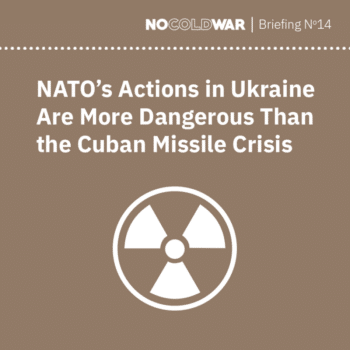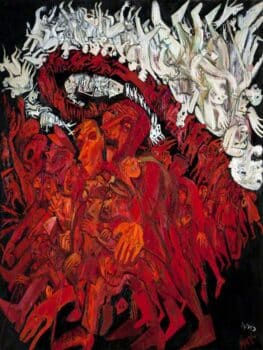 Dear friends,
Dear friends,
Greetings from the desk of Tricontinental: Institute for Social Research.
There was a time when calls for a nuclear-free Europe rang across the continent. It began with the Stockholm Appeal (1950), which opened with the powerful words ‘We demand the outlawing of atomic weapons as instruments of intimidation and mass murder of peoples’ and then deepened with the Appeal for European Nuclear Disarmament (1980), which issued the chilling warning ‘We are entering the most dangerous decade in human history’. Roughly 274 million people signed the Stockholm Appeal, including—as is often reported—the entire adult population of the Soviet Union. Yet, since the European appeal of 1980, it feels as if each decade has been more and more dangerous than the previous one. ‘It is still 90 seconds to midnight’, the editors at the Bulletin of the Atomic Scientists (the keepers of the Doomsday Clock) wrote in January. Midnight is Armageddon. In 1949, the clock sat at three minutes to midnight, and in 1980 it had retreated slightly from the precipice, back to seven minutes to midnight. By 2023, however, the clock’s hand had moved all the way up to ninety seconds to midnight, where it remains, the closest we have ever been to full-scale annihilation.
This precarious situation is threatening to reach a tipping point in Europe today. To understand the dangerous possibilities that could be unleashed by the intensified provocations around Ukraine, we collaborated with No Cold War to produce briefing no. 14, NATO’s Actions in Ukraine Are More Dangerous than the Cuban Missile Crisis. Please read this text carefully and circulate it as widely as possible.
For the past two years, Europe’s largest war since 1945 has been raging in Ukraine. The root cause of this war is the U.S.-driven attempt to expand the North Atlantic Treaty Organisation (NATO) into Ukraine. This violates the promises the West made to the Soviet Union during the end of the Cold War, such as that NATO would move ‘not one inch eastward’, as U.S. Secretary of State James Baker assured Soviet President Mikhail Gorbachev in 1990. Over the past decade, the Global North has repeatedly snubbed Russian requests for security guarantees. It was this disregard for Russian concerns that led to the outbreak of the conflict in 2014 and the war in 2022.

Elif Uras (Turkey), Kapital, 2009.
Today, a nuclear-armed NATO and a nuclear-armed Russia are in direct conflict in Ukraine. Instead of taking steps to bring this war to an end, NATO has made several new announcements in recent months that threaten to escalate the situation into a still more serious conflict with the potential to spill beyond Ukraine’s borders. It is no exaggeration to say that this conflict has created the greatest threat to world peace since the Cuban Missile Crisis (1962).
This extremely dangerous escalation confirms the correctness of the majority of U.S. experts on Russia and Eastern Europe, who have long warned against the expansion of NATO into Eastern Europe. In 1997, George Kennan, the principal architect of U.S. policy in the Cold War, said that this strategy is ‘the most fateful error of American policy in the entire post-Cold War era’. The Ukraine war and the dangers of further escalation fully affirm the seriousness of his warning.
How Is NATO Escalating the Conflict in Ukraine?
The most dangerous recent developments in this conflict are the decisions by the US and Britain in May to authorise Ukraine to use weapons supplied by the two countries to conduct military attacks inside Russia. Ukraine’s government immediately used this in the most provocative way by attacking Russia’s ballistic missile early warning system. This warning system plays no role in the Ukraine war but is a central part of Russia’s defence system against strategic nuclear attack. In addition, the British government supplied Ukraine with Storm Shadow missiles that have a range of over 250 km (155 miles) and can hit targets not only on the battleground but far inside Russia. The use of NATO weapons to attack Russia risks an equivalent Russian counter-response, threatening to spread the war beyond Ukraine.
This was followed by NATO Secretary-General Jens Stoltenberg’s June announcement that a NATO headquarter for operations in the Ukraine war had been created at the U.S. military base in Wiesbaden, Germany, with 700 initial staff. On 7 June, French President Emmanuel Macron said that his government was working to ‘finalise a coalition’ of NATO countries willing to send troops to Ukraine to ‘train’ Ukrainian forces. This would place NATO forces directly in the war. As the Vietnam War and other conflicts have shown, such ‘trainers’ organize and direct fighting, thus becoming targets for attacks.

Nadia Abu-Aitah (Switzerland), Breaking Free, 2021.
Why Is Escalation in Ukraine More Dangerous than the Cuban Missile Crisis?
The Cuban Missile Crisis was the product of an adventurist miscalculation by Soviet leadership that the U.S. would tolerate the presence of Soviet nuclear missiles only 144 km from the nearest U.S. shore and roughly 1,800 km from Washington. Such a deployment would have made it impossible for the U.S. to defend against a nuclear strike and would have ‘levelled the playing field’, since the U.S. already had such capabilities vis-à-vis the Soviet Union. The U.S., predictably, made it clear that this would not be tolerated and that it would prevent it by any means necessary, including nuclear war. With the Doomsday Clock at 12 minutes to midnight, the Soviet leadership realised its miscalculation and, after a few days of intense crisis, withdrew the missiles. This was followed by a relaxation of U.S.-Soviet tensions, leading to the first Nuclear Test Ban Treaty (1963).
No bullets flew between the U.S. and the USSR in 1962. The Cuban Missile Crisis was an extremely dangerous short-term incident that could have ignited large-scale—including nuclear—war. However, unlike the Ukraine war, it did not flow from an already existing and intensifying dynamic of war by either the U.S. or the USSR. Thus, while extremely dangerous, the situation could also be, and was, rapidly resolved.
The situation in Ukraine, as well as the growing conflict around China, are more structurally dangerous. Direct confrontation is taking place between NATO and Russia, where the U.S. just authorised direct military strikes (imagine if, during the 1962 crisis, Cuban forces armed and trained by the Soviet Union had carried out major military strikes in Florida). Meanwhile, the U.S. is directly raising military tensions with China around Taiwan and the South China Sea, as well as in the Korean Peninsula. The U.S. government understands that it cannot withstand erosion to its position of global primacy and rightly believes that it may lose its economic dominance to China. That is why it increasingly moves issues onto the military terrain, where it still maintains an advantage. The U.S. position on Gaza is significantly determined by its understanding that it cannot afford a blow to its military supremacy, embodied in the regime that it controls in Israel.
The U.S. and its NATO partners are responsible for 74.3% of global military spending. Within the context of the US’s increasing drive for war and use of military means, the situation in Ukraine, and potentially around China, are, in reality, as dangerous, and potentially more dangerous than the Cuban Missile Crisis.

Tatiana Grinevich (Belarus), The River of Wishes, 2012.
How Are the Warring Parties to Negotiate?
Hours after Russian troops entered Ukraine, both sides began to talk about a drawdown of tensions. These negotiations developed in Belarus and Turkey before they were scuttled by NATO’s assurances to Ukraine of endless and bottomless support to ‘weaken’ Russia. If those early negotiations had developed, thousands of lives would have been spared. All such wars end in negotiations, which is why the sooner they could have happened, the better. This is a view that is now openly acknowledged by Ukrainians. Vadym Skibitsky, deputy head of Ukraine’s military intelligence, told The Economist that negotiations are on the horizon.
For a long time now, the Russia-Ukraine frontline has not moved dramatically. In February 2024, the Chinese government released a twelve-point set of principles to guide a peace process. These points—including ‘abandoning the Cold War mentality’—should have been seriously considered by the belligerent sides. But the NATO states simply ignored them. Several months later, a Ukraine-driven conference was held in Switzerland from 15—16 June, to which Russia was not invited and which ended with a communiqué that borrowed many of the Chinese proposals about nuclear safety, food security, and prisoner exchanges.
While a number of states—from Albania to Uruguay—signed the document, other countries that attended the meeting refused to sign on for a range of reasons, including their sense that the text did not take Russia’s security concerns seriously. Among the countries that did not sign are Armenia, Bahrain, Brazil, India, Indonesia, Jordan, Libya, Mauritius, Mexico, Saudi Arabia, South Africa, Thailand, and the United Arab Emirates. A few days before the Switzerland conference, Russia’s President Vladimir Putin stated his conditions for peace, which include a guarantee that Ukraine will not join NATO. This view is shared by those countries of the Global South that did not join the Switzerland statement.
Both Russia and Ukraine are willing to negotiate. Why should the NATO states be allowed to prolong a war that threatens world peace? The upcoming NATO summit in Washington from 9—11 July must hear, loudly and clearly, that the world does not want its dangerous war or decadent militarism. The world’s peoples want to build bridges, not blow them up.

Maxim Kantor (Russia), Two Versions of History, 1993.
Briefing no. 14, a clear assessment of current dangers around the escalation in and around Ukraine, underscores the need, as Abdullah El Harif of the Workers’ Democratic Way party in Morocco and I wrote in the Bouficha Appeal Against the Preparations for War in 2020, for the peoples of the world to:
- Stand against the warmongering of U.S. imperialism, which seeks to impose dangerous wars on an already fragile planet.
- Stand against the saturation of the world with weapons of all kinds, which inflame conflicts and often drive political processes toward endless wars.
- Stand against the use of military power to prevent the social development of the peoples of the world.
- Defend the right of countries to build their sovereignty and their dignity.
Sensitive people around the world must make their voices heard on the streets and in the corridors of power to end this dangerous war, and indeed to set us on a path beyond capitalism’s world of unending wars.
Warmly,
Vijay

